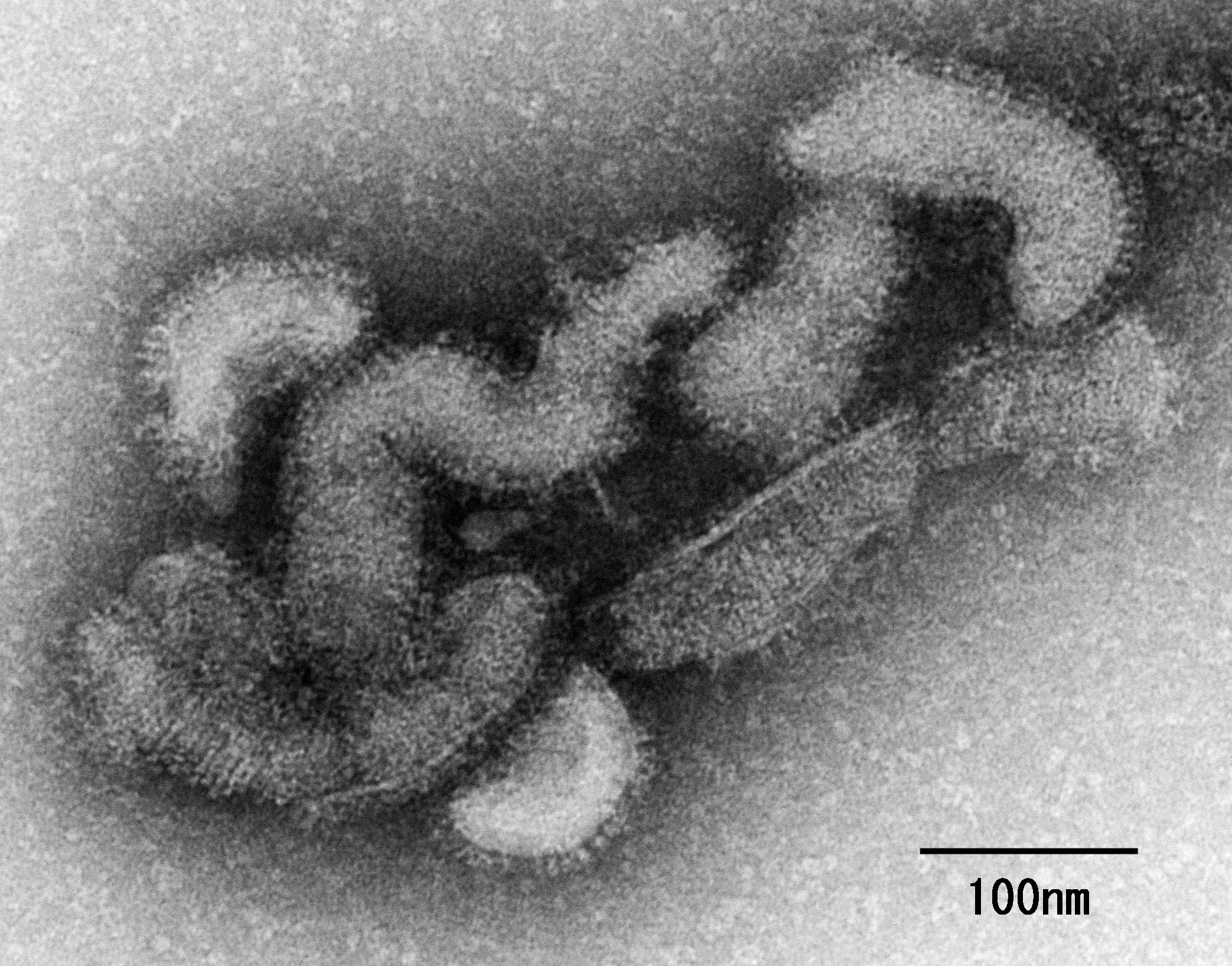Updated July 5, 2023
National Institute of Infectious Diseases, Japan
Oz virus (OZV) is an RNA virus of the genus Thogotovirus, family Orthomyxoviridae. This virus was first isolated from Amblyomma testudinarium ticks in Japan and was named Oz virus in 2018. Although human infection has been suggested by previous human serological research, no confirmed case of human infection had been reported worldwide. In June 2023, the world's first case of human infection (fatal case) with Oz virus was reported in Japan (IASR report: Japanese).
Pathogen
OZV is an enveloped virus with a six-segmented, single-stranded, negative-stranded RNA belonging to the genus Thogotovirus in the family Orthomyxoviridae. It was first isolated from Amblyomma testudinarium ticks in Ehime Prefecture, Japan (Ejiri H, et al., 2018). OZV has not been reported outside Japan.

Figure1. Electron micrograph of Oz virus particles
Distribution
Amblyomma testudinarium ticks are distributed westward from the Kanto region. Serum antibody surveys conducted in wildlife suggest a history of OZV infection in macaques (Macaca fuscata), wild boars (Sus scrofa leucomystax), and sika deer (Cervus nippon) in Chiba, Gifu, Mie, Wakayama, Yamaguchi, and Oita prefectures (Tran NTB, et al., 2022). Among serum samples from healthy hunters in Yamaguchi Prefecture from 2013 to 2019, two of the 24 samples tested positive for anti-OZV antibodies (Tran NTB et al., 2022). These findings had suggested a potentially wide geographic distribution of OZV in Japan.
Clinical Symptoms
The case in Japan is the only reported case of human OZV infection (IASR report: Japanese), making characterization of the clinical symptoms associated with OZV infection difficult. The reported case-patient presented with fatigue, loss of appetite, vomiting, joint pain, and a fever of 39 °C, ultimately resulting in viral myocarditis and death.
As described above, a human serological study of hunters indicating a history of infection suggests that OZV may not always be fatal However, further investigation is required to elucidate this disease.
Transmission
OZV has been detected in Amblyomma testudinarium ticks that bite humans. In the case from Japan (IASR report: Japanese), an attached engorged tick was observed, indicating that a tick bite may have served as a potential transmission route. However, conclusive evidence on the exact route of transmission is lacking. The sole reported case of human infection is the case-patient reported in June 2023, and the route of transmission for this case remains inconclusive.
Pathogen Diagnosis
Pathogen diagnosis can be achieved through the isolation and identification of the virus from samples such as whole blood, or, by detecting viral genes using RT-PCR (Ejiri et al., 2018). Paired serology testing can also be used for the diagnosis. These diagnostic tests can be conducted at the National Institute of Infectious Diseases.
Treatment
Currently, there are no known effective antiviral drugs and supportive care is the only treatment available.
Prevention
While definitive evidence regarding the transmission route is lacking, as tick bites may be the cause of infection, preventive measures such as minimizing skin exposure and use of repellants outdoors to avoid tick bites should be taken. Vaccines are not available.
References
・ Ejiri H, et al. 2018. Characterization of a Novel Thogotovirus Isolated from Amblyomma Testudinarium Ticks in Ehime, Japan: A Significant Phylogenetic Relationship to Bourbon Virus. Virus Research 249 (April): 57–65.
・ Tran NTB, et al. 2022. Zoonotic Infection with OZ virus, a Novel Thogotovirus. Emerging Infectious Diseases 28 (2): 436–39.


